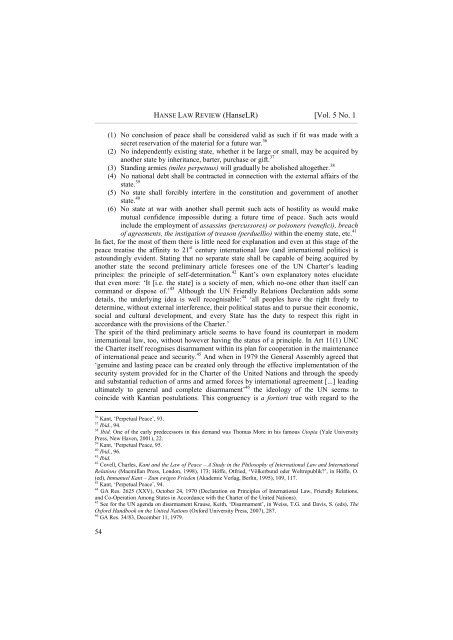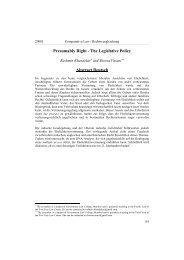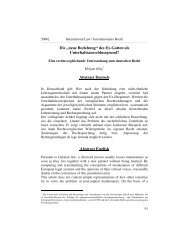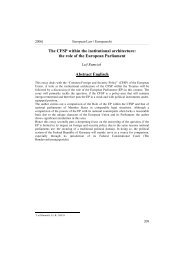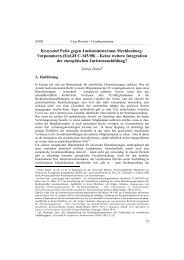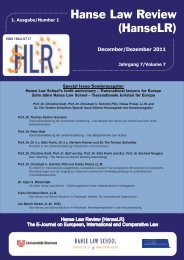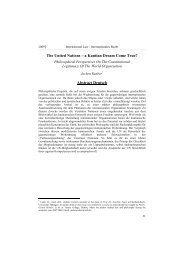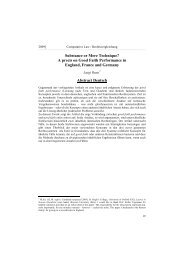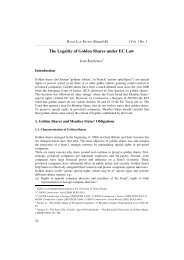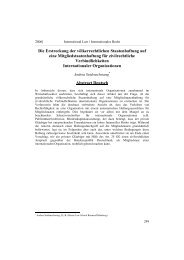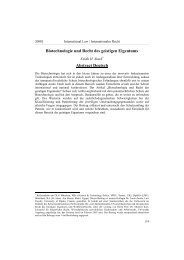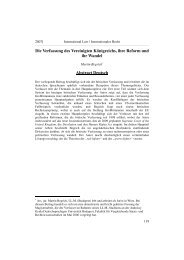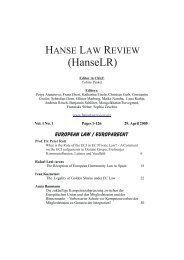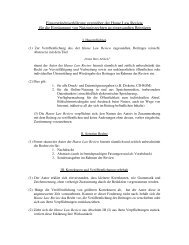The United Nations – a Kantian Dream Come True? - Hanse Law ...
The United Nations – a Kantian Dream Come True? - Hanse Law ...
The United Nations – a Kantian Dream Come True? - Hanse Law ...
Create successful ePaper yourself
Turn your PDF publications into a flip-book with our unique Google optimized e-Paper software.
HANSE LAW REVIEW (<strong>Hanse</strong>LR) [Vol. 5 No. 1<br />
___________________________________________________________________________________________________________________________________________________<br />
(1) No conclusion of peace shall be considered valid as such if fit was made with a<br />
secret reservation of the material for a future war. 36<br />
(2) No independently existing state, whether it be large or small, may be acquired by<br />
another state by inheritance, barter, purchase or gift. 37<br />
(3) Standing armies (miles perpetuus) will gradually be abolished altogether. 38<br />
(4) No national debt shall be contracted in connection with the external affairs of the<br />
state. 39<br />
(5) No state shall forcibly interfere in the constitution and government of another<br />
state. 40<br />
(6) No state at war with another shall permit such acts of hostility as would make<br />
mutual confidence impossible during a future time of peace. Such acts would<br />
include the employment of assassins (percussores) or poisoners (venefici), breach<br />
of agreements, the instigation of treason (perduellio) within the enemy state, etc. 41<br />
In fact, for the most of them there is little need for explanation and even at this stage of the<br />
peace treatise the affinity to 21 st century international law (and international politics) is<br />
astoundingly evident. Stating that no separate state shall be capable of being acquired by<br />
another state the second preliminary article foresees one of the UN Charter’s leading<br />
principles: the principle of self-determination. 42 Kant’s own explanatory notes elucidate<br />
that even more: ‘It [i.e. the state] is a society of men, which no-one other than itself can<br />
command or dispose of.’ 43 Although the UN Friendly Relations Declaration adds some<br />
details, the underlying idea is well recognisable: 44 ‘all peoples have the right freely to<br />
determine, without external interference, their political status and to pursue their economic,<br />
social and cultural development, and every State has the duty to respect this right in<br />
accordance with the provisions of the Charter.’<br />
<strong>The</strong> spirit of the third preliminary article seems to have found its counterpart in modern<br />
international law, too, without however having the status of a principle. In Art 11(1) UNC<br />
the Charter itself recognises disarmament within its plan for cooperation in the maintenance<br />
of international peace and security. 45 And when in 1979 the General Assembly agreed that<br />
‘genuine and lasting peace can be created only through the effective implementation of the<br />
security system provided for in the Charter of the <strong>United</strong> <strong>Nations</strong> and through the speedy<br />
and substantial reduction of arms and armed forces by international agreement [...] leading<br />
ultimately to general and complete disarmament’ 46 the ideology of the UN seems to<br />
coincide with <strong>Kantian</strong> postulations. This congruency is a fortiori true with regard to the<br />
36 Kant, ‘Perpetual Peace’, 93.<br />
37 Ibid., 94.<br />
38 Ibid. One of the early predecessors in this demand was Thomas More in his famous Utopia (Yale University<br />
Press, New Haven, 2001), 22.<br />
39 Kant, ‘Perpetual Peace, 95.<br />
40 Ibid., 96.<br />
41 Ibid.<br />
42 Covell, Charles, Kant and the <strong>Law</strong> of Peace <strong>–</strong> A Study in the Philosophy of International <strong>Law</strong> and International<br />
Relations (Macmillan Press, London, 1998), 173; Höffe, Otfried, ‘Völkerbund oder Weltrepublik?’, in Höffe, O.<br />
(ed), Immanuel Kant <strong>–</strong> Zum ewigen Frieden (Akademie Verlag, Berlin, 1995), 109, 117.<br />
43 Kant, ‘Perpetual Peace’, 94.<br />
44 GA Res. 2625 (XXV), October 24, 1970 (Declaration on Principles of International <strong>Law</strong>, Friendly Relations,<br />
and Co-Operation Among States in Accordance with the Charter of the <strong>United</strong> <strong>Nations</strong>).<br />
45 See for the UN agenda on disarmament Krause, Keith, ‘Disarmament’, in Weiss, T.G. and Davis, S. (eds), <strong>The</strong><br />
Oxford Handbook on the <strong>United</strong> <strong>Nations</strong> (Oxford University Press, 2007), 287.<br />
46 GA Res. 34/83, December 11, 1979.<br />
54


